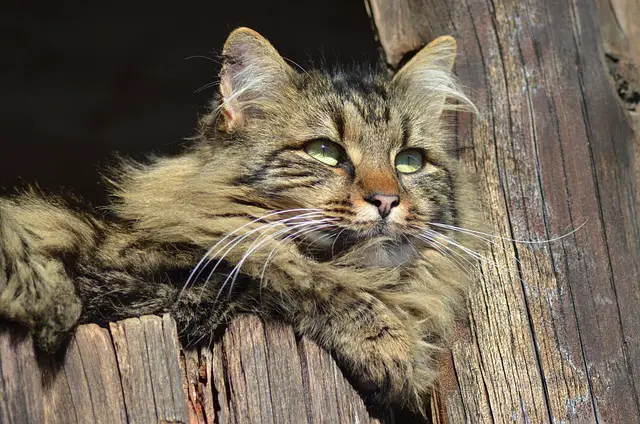It’s easy to want to add a pet cat to your farm, but there are some essential things to consider before bringing one home. Cats may be adorable and cuddly but they can also be natural predators. So if you choose to keep one on your farm, you must determine whether or not it poses a risk to your livestock. Will farm cats attack chickens? Let’s take a look at the facts.
Will farm cats attack chickens?
No one wants to risk their chickens getting attacked when bringing a farm cat onto the property.
But if a responsible owner is careful, then an unlikely bond can form between the cats and chickens, leading to the protection of their shared habitat.
I suggest slowly but steadily introducing the two species – a gradual process is more likely to be successful.
Start by following some simple tips, such as having plenty of hiding spaces for the chickens, keeping a close eye on possible bullying from other cats on your property, and providing readily available healthy food and water sources.
You can foster an agreeable living situation between cats and chickens with patience and reasonable precautions.
Farm Cats vs. Wild Cats
A key distinction is between domestic cats and farm cats. Domestic cats have been bred over generations as companion animals, while farm cats are descendants of European Wildcats with very different behavior and instincts than their domesticated counterparts.
Farm cats will hunt small prey such as birds, rodents, and rabbits and should not be kept close to any of these animals.
Training
Even wild farm cats can be taught not to attack chickens or other animals with proper training.
The key is consistency—start by introducing them slowly in an area where the cat cannot access the chickens directly or through fencing/pencils/netting/etc.
Once comfortable around each other, reward good behavior with treats or positive reinforcement when they show no signs of aggression towards your poultry.
Training can also help reduce stress levels in both the cat and the chicken flock by teaching them how to interact safely with one another without fear of harm or injury.
Supervision
Regardless of breed or training status, all cats should be supervised while in close contact with other animals like chickens on your farm; this includes keeping them indoors if necessary when you are away from home or unable to monitor their activities closely enough for safety purposes.
In addition, consider providing areas for the cat designed explicitly for its comfort and a safe haven away from livestock (like a bed box).
These measures will help ensure that interactions between your cat and other animals on your property remain peaceful and free from conflict or danger.
Conclusion
Farm cats can attack chickens if not given proper guidance and supervision; however, with careful consideration and training, they can coexist peacefully on the same property as long as they are closely monitored. Ultimately, it is up to you as an owner whether or not you decide to bring a pet cat onto your farm—but if you choose this route, then make sure that all safety precautions have been taken into account before allowing these two species into proximity with one another.
This includes providing them with adequate living space and regular training sessions so that both parties know how best to interact without fear or aggression towards each other for everyone involved (including yourself) to have a positive experience.
[su_box title=”Affiliate Disclosure”]This website is supported by its readers. Please assume that all links are affiliate links. If you make a purchase from one of the links we will make a commission from Amazon. Thank you.[/su_box]




